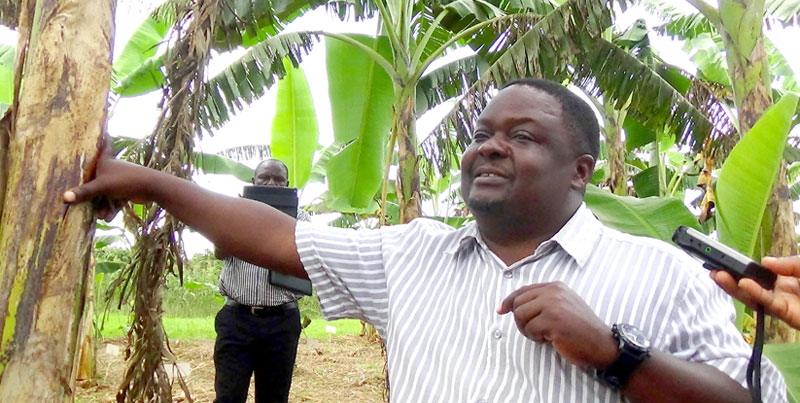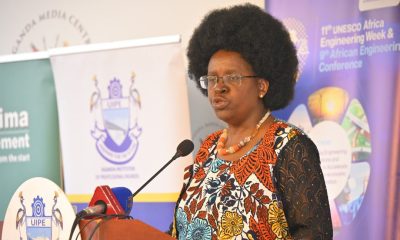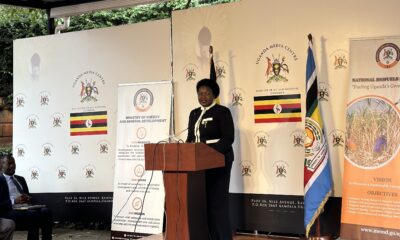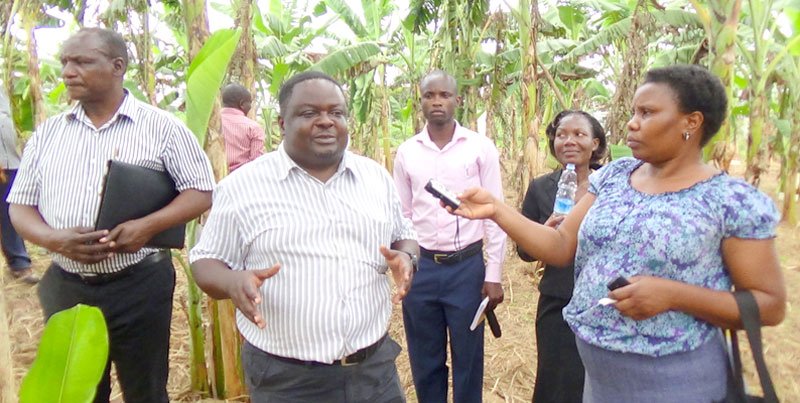Analysis
Unfriendly working Environment Driving Scientists out of Uganda
Two senior banana breeders and a regulator leave for greener pastures
In the last couple of months, Uganda has lost three senior scientists who have left to work for private multinational corporations or international and regional research institutions.
Their departure has however resurrected concerns in the scientific community that the government is not doing enough to keep scientists happy.
Dr. Andrew Kiggundu, who has been heading the country’s first Biotechnology Laboratory at NARL – Kawanda, and one of Africa’s eminent researchers on Bananas is set to join the Donald Danforth Plant Science Centre, a top research firm based in the State of Missouri in the United States.
Two other senior scientists, Dr. Tendo Ssali, a banana breeder at NARL and Dr. Julius Ecuru, the former Deputy Executive Director at the Uganda National Council for Science and Technology (UNCST) have also left their jobs to pursue other juicer jobs outside the country.
Dr. Ssali has reportedly joined the International Potatoe centre (CIP) based in the Peruvian capital Lima, while Dr. Ecuru has joined the Nairobi-based International Centre of Insect Physiology and Ecology (ICIPE).
But the departure of Kiggundu has particularly shocked top administrators at the National Agricultural Research Organisation (NARO) in Entebbe, because of his ability to publicly breakdown complex science to lay people, besides his dedication towards practising and defending the use of home-grown solutions to problems afflicting farmers.
Beyond his scientific research accomplishments in laboratories, Dr. Kiggundu has in recent years become a famous advocate for the use of modern agricultural science in Uganda’s development through presentations on radio talk shows, in parliamentary sessions and sensitization workshops.
In a telephone interview with The Sunrise, Dr. Kiggundu downplayed the importance of his departure as temporary and only motivated by the desire to advance his career.
“I will be away for just one year. It’s not a big deal,” Kiggundu told this reporter in an interview. But as careers can evolve, it’s not impossible to imagine him spending a couple more years with a first class research institution.
Commenting about Kiggundu’s untimely departure, Peter Wamboga Mugirya, the Director of Communications at the Science Foundation for Livelihoods and Development (Scifode) blamed the government’s unwillingness to pay its own scientists well, and the ‘ poor working environment’ which he says does not motivate researchers to have desired impact on society.
Wamboga said: “Kiggundu’s departure means, in my opinion, that NARO or the Government of Uganda for that matter didn’t retain or maintain him for him to sustain confidence and trust in the system. Perhaps a foreign or international institution shall care much better [including paying him higher and boost morale] than the Ugandan state.”
Wamboga further argues that Kiggundu’s departure also means that inspite of President Yoweri Museveni’s publicised commitment to raise the pay of scientists, very little progress has been achieved on this front.
“In spite of the President’s pronouncements in support of science and technology-that scientists’ pay and morale should be boosted upwards in each annual budget-little has been done the last over 20 years or so, hence the exodus. In a nutshell, Uganda is the loser while recipient countries are benefiting from the departure from Uganda of the most precious resource on earth-the human expertise,” added Wamboga.
Dr. Kiggundu’s pioneering research in the use of advanced methods such as genetic engineering to counter pervasive diseases such as Banana bacterial wilt, black Sigatoka, resistance against weavils and nematodes on the one hand, and addressing Vitamin A deficiencies in cooking bananas, have made Kiggundu as one of the most sought-after scientists on the continent.
Reliable sources say that he has previously turned down advances from national regional research programmes from Rwanda.
Besides teaching Masters students, Kiggundu’s busy docket included being a Principle Investigator in the Kachwekano-based project that seeks build resistance to the fungal late blight disease that is currently causing widespread losses among Irish potatoe farmers especially in Kabale, Kisoro and Kapchorwa where the crop is not only a major staple food but also a key source of income.
Although the project had passed the confined field trials, it was yet to undergo multi-location trials with farmers, as well as passing other regulatory processes.
Dr. Kiggundu was also leading a team of researchers to try to develop ground nuts that are resistant to fungi that enables ground nuts and maize to grow moulds or chemical compounds (Aflatoxins) that destroy the liver when eaten either by humans or animals.
Describing Kiggundu as an unmatched cool-tempered person, Wamboga said Kiggundu’s departure is a blow to the scientific community’s efforts to popularise modern agricultural science to policy makers and the general public.
Wamboga said: “Uganda’s pro-biotech coalition is the loser of a key pillar in the public education and sensitization efforts. The task to popularize the National Biotech and Biosafety Bill of course becomes harder than simpler with absence of lead-researcher.”
Clet Wandui Masiga, the Director of Research at the Tropical Institute of Development Initiatives, argues that he suspects Kiggundu’s departure was motivated by the desire for career advancement, having worked in the same job for more than ten years.
But Masiga added: “What keeps scientists in Uganda is that they feel happy when they are able to contribute to solving a problem or that a product they have developed is being eaten all over Uganda. But here’s is a situation where we have so many NGOs and Politicians that are hostile to science. So I think a number of scientists feel they are not appreciated.”
Perhaps more worrisome is that Kiggundu is following a growing trend of top scientists who are leaving the country for greener pastures because of the perception or reality that their contributions are not getting embraced for national development.
Masiga reminds us that Uganda loses quite a bit of talent nearly every year to regional as well as international research institutions. Some of those that have left include Dr. Robert Mwanga who joined the International Potato Centre and went ahead to win, along with colleagues, the 2016 World Food Prize for their research in developing Vitamin A (Orange fleshed sweet potatoes).
Other notable scientists the country has lost include Dr. Sarah Mubiru who joined the Association for Strengthening Agricultural Research in Eastern and Central Africa (ASARECA), Dr. Drake Mubiru who joined the International Institute of Tropical Agriculture (IITA).
Former NARO Director General Dr. Denis Kyetere left to head the Nairobi-based African Agricultural Technology Foundation (AATF). Also NARO’s former Deputy Director in Charge of Quality Assurance Dr. Cyprian Ebong, left the country to Rwanda to provide expert advice to its Agricultural Board, before he was appointed early this year as the Executive Secretary for ASARECA.
Despite, the departure of imminent scientists, Uganda has made significant progress in terms of capacity building both in terms of human resource as well as technical capacity. The tremendous achievements made in terms of infrastructural development have however mostly courtesy of donor support from international organisations like the Bill and Melinda Gates foundation.
Although the ease with which Uganda’s top researchers are finding jobs regionally and internationally may be interpreted as an outcome of a good education system, the ongoing hunger and high levels of poverty especially among rural farmers is a wringing indictment on the government’s failure to translate the expertise of its own people to find solutions to hunger and poverty.
Comments




























